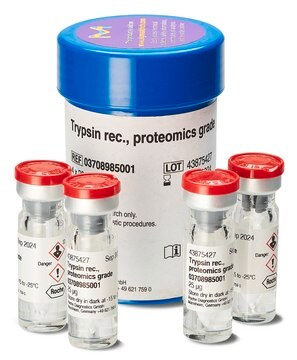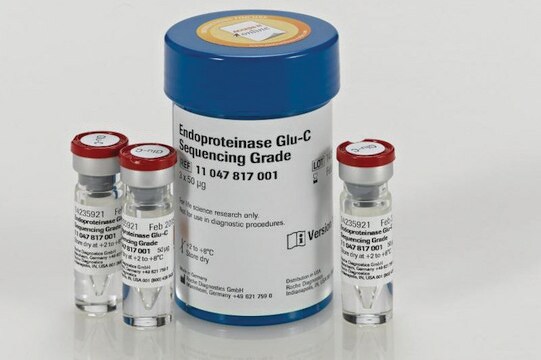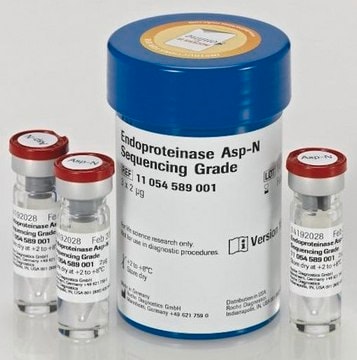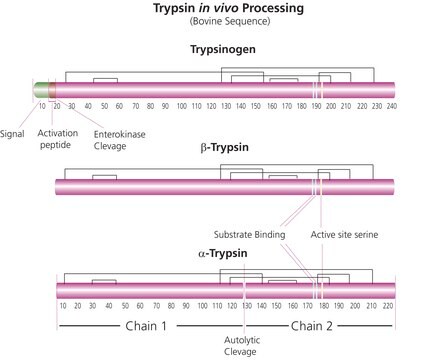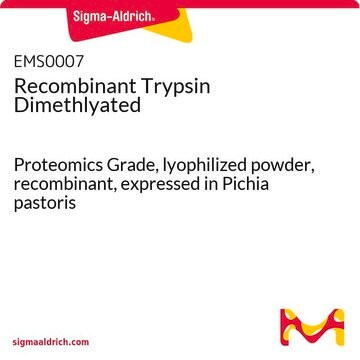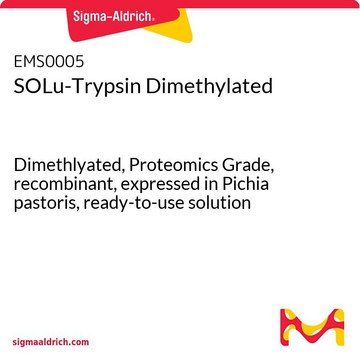TRYPSEQM-RO
Roche
Trypsin Sequencing Grade, modified
from bovine pancreas
Sinonimo/i:
Trypsin
About This Item
Prodotti consigliati
Origine biologica
bovine pancreas
Livello qualitativo
Grado
protein sequencing grade
Forma fisica
lyophilized (salt-free)
PM
24.000 g/mol
Confezionamento
pkg of 4 × 100 μg (11418033001)
pkg of 4 × 25 μg (11418025001)
Produttore/marchio commerciale
Roche
Condizioni di stoccaggio
(Keep container tightly closed in a dry and well-ventilated place.)
Concentrazione
0.01-0.2 % (w/w)
tecniche
protein sequencing: suitable
Impurezze
Chymotrypsin
Colore
white
pH ottimale
8.0
Solubilità
10 g/L
Compatibilità
suitable for protein modification
N° accesso UniProt
applicazioni
life science and biopharma
Attività estranea
Contaminating activities corresponds
Chymotrypsin , contains
Temperatura di conservazione
2-8°C
Informazioni sul gene
cow ... PRSS1(780933)
Descrizione generale
Trypsin is a highly efficient and specific protease widely used in proteomics for protein digestion. It produces short peptides with specific characteristics that are compatible with current separation and identification methods such as liquid chromatography, mass spectrometry (MS).
Inhibitors: TLCK, DFP, PMSF, leupeptin, soybean trypsin inhibitor, trypsin inhibitor from hen egg, aprotinin, α2-macroglobulin,α1-antitrypsin, APMSF, and antipain.
Specificità
Applicazioni
It is used for:
- Protein-structure elucidation
- Tryptic mapping
- Fingerprinting analysis
- Sequence analysis
- Translocation studies
- Protein identification
- Protein digestion during lipoprotein preparation for liquid chromatography-tandem mass spectrometry (LC-MS/MS)
Qualità
Nota sulla preparazione
Storage conditions (working solution): -15 to -25 °C
Trypsin Sequencing Grade, modified, is more resistant to autolysis, even at pH values in the neutral and weakly basic range. The enzyme can be used in high concentrations.
A solution in 1% acetic acid or 1 mM HCI can be used for up to one week when stored at 2 to 8° C. Stored in aliquots at -15 to -25 °C, the solution is stable for at least one year without loss of activity.
Stoccaggio e stabilità
Altre note
Avvertenze
Danger
Indicazioni di pericolo
Consigli di prudenza
Classi di pericolo
Eye Irrit. 2 - Resp. Sens. 1 - Skin Irrit. 2 - STOT SE 3
Organi bersaglio
Respiratory system
Codice della classe di stoccaggio
11 - Combustible Solids
Classe di pericolosità dell'acqua (WGK)
WGK 1
Punto d’infiammabilità (°F)
Not applicable
Punto d’infiammabilità (°C)
Not applicable
Certificati d'analisi (COA)
Cerca il Certificati d'analisi (COA) digitando il numero di lotto/batch corrispondente. I numeri di lotto o di batch sono stampati sull'etichetta dei prodotti dopo la parola ‘Lotto’ o ‘Batch’.
Possiedi già questo prodotto?
I documenti relativi ai prodotti acquistati recentemente sono disponibili nell’Archivio dei documenti.
I clienti hanno visto anche
Il team dei nostri ricercatori vanta grande esperienza in tutte le aree della ricerca quali Life Science, scienza dei materiali, sintesi chimica, cromatografia, discipline analitiche, ecc..
Contatta l'Assistenza Tecnica.
